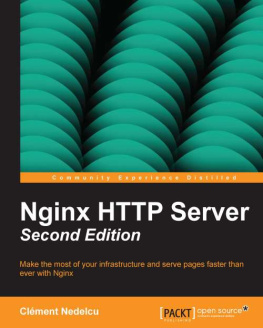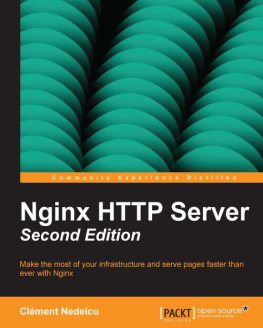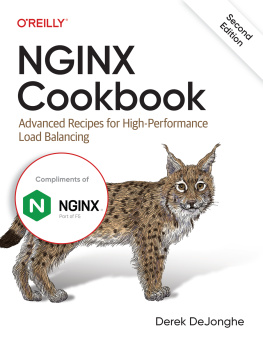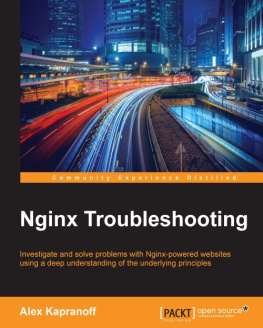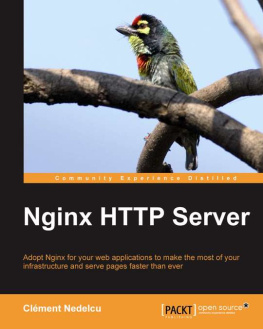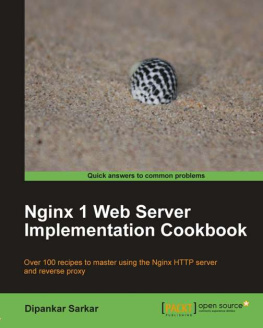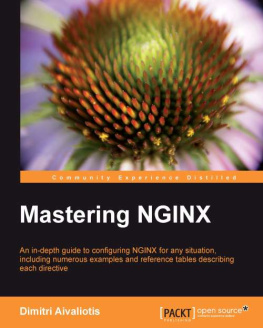Joel T. Johnson
About the Author
Clment Nedelcu was born in France and studied in UK, French, and Chinese universities. After teaching computer science and programming in several eastern Chinese universities, he worked as a Technology Consultant in France, specializing in web and Microsoft .NET programming as well as Linux server administration. Since 2005, he has also been administering a major network of websites in his spare time. This eventually led him to discover Nginx: it made such a difference that he started his own blog about it. One thing leading to another
I would like to express my gratitude to my wife Julie, my son Leo who was born during the writing of this book and never ceased to cheer me up; my family and my friends who have all been very supportive all along the writing stage. This book is dedicated to Martin Fjordvald for originally directing me to Nginx when my servers were about to kick the bucket. Special thanks to Cliff Wells, Maxim Dounin, and all the folks on the #nginx IRC channel on Freenode.
About the Reviewers
Michael Shadle is a self-proclaimed surgeon, when it comes to procedural PHP. He has been using PHP for over ten years along with MySQL and various Linux and BSD distributions. He has switched between many different web servers over the years and considers Nginx to be the best solution yet.
During the day he works as a senior Web Developer at Intel Corporation on a handful of public-facing websites. He enjoys using his breadth of knowledge to come up with "out of the box" solutions to solve the variety of issues that come up. During the off-hours, he has a thriving personal consulting, web development practice, and has many more personal project ideas than he can tackle at once.
He is a minimalist by heart, and believes that when architecting solutions, starting small and simple allows for a more agile approach in the long run. Michael also coined the phrase, "A simple stack is a happy stack."
Alex Kapranoff was born in a family of an electronics engineer and a programmer for old Soviet "Big Iron" computers. He started to write programs at the age of 12 and has never worked outside of the IT industry since then. After getting his Software Engineering degree with honors he had a short stint in the world of enterprise databases and Windows. Then he settled on open-source Unix-like environments for good, first FreeBSD and then Linux, working as a developer for many Russian companies from ISPs to search engines. Most of his experience has been with e-mail/messaging systems and web security. Right now he is trying his hand at a product and project management position in Yandex, one of the biggest search engines in the world.
He took his first look at Nginx working in Rambler side-by-side with Nginx's author Igor Sysoev before the initial public release of the product. Since then, Nginx has been an essential tool in his kit. He won't launch a website, no matter how complex it is, without using Nginx nowadays.
He strongly believes in the Free Software Movement, loves Perl, plain C, LISP, cooking, and fishing, and lives with a beautiful girlfriend and an old cat in Moscow, Russia.
www.PacktPub.com
Support files, eBooks, discount offers and more
You might want to visit www.PacktPub.com for support files and downloads related to your book.
Did you know that Packt offers eBook versions of every book published, with PDF and ePub files available? You can upgrade to the eBook version at > for more details.
At www.PacktPub.com, you can also read a collection of free technical articles, sign up for a range of free newsletters and receive exclusive discounts and offers on Packt books and eBooks.
http://PacktLib.PacktPub.com
Do you need instant solutions to your IT questions? PacktLib is Packt's online digital book library. Here, you can access, read and search across Packt's entire library of books.
Why Subscribe?
- Fully searchable across every book published by Packt
- Copy and paste, print and bookmark content
- On demand and accessible via web browser
Free Access for Packt account holders
If you have an account with Packt at www.PacktPub.com, you can use this to access PacktLib today and view nine entirely free books. Simply use your login credentials for immediate access.
Preface
It is a well-known fact that the market of web servers has a long-established leader: Apache. According to recent surveys, as of January 2013, over 55 percent of the World Wide Web is served by this eighteen-year old open source application. However, for the past few years, the same reports reveal the rise of a new competitor: Nginx, a lightweight HTTP server originating from Russia (pronounced engine X ). There have been many interrogations surrounding this young web server. Why has the blogosphere become so effervescent about it? What is the reason causing so many server administrators to switch to Nginx since the beginning of 2009? Is this tiny piece of software mature enough to run my high-traffic website?
To begin with, Nginx is not as young as one might think. Originally started in 2002, the project was first carried out by a standalone developer, Igor Sysoev, for the needs of an extremely high-traffic Russian website, namely Rambler, which as of September 2008, received over 500 million HTTP requests per day. The application is now used to serve some of the most popular websites on the Web such as Facebook, Netflix, WordPress, SourceForge, and many more. Nginx has proven to be a very efficient, lightweight, yet powerful web server.

